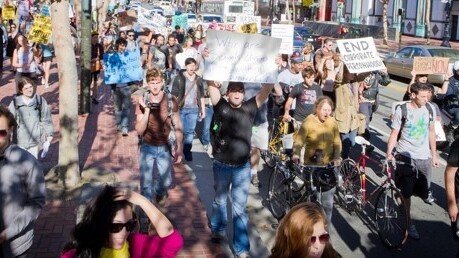
There’s been a lot of analysis of the Occupy movement since it began to make a mark around the world two months ago. This week I attended a debate about the movement and a lot of the talk revolved around what the point of it all was. To me, that’s irrelevant .
Sure, in the short term, questions like ‘will they actually achieve anything?’ are important to consider. However, what’s interesting to me isn’t where it goes – it’s the fact that this is very much an ‘online’ way of acting that’s being brought to the streets of the globe’s major cities.
Taking online voices to the streets
 As has been pointed out many times, one of the core characteristics of Occupy is that the people involved don’t share a common goal. Some of them want to overthrow the state, others want an end to public sector cuts and some just feel that they’re unhappy with the status quo and don’t have an answer – they’ve come together to express this general malcontent in a highly visible way, even if their motives and aims may vary.
As has been pointed out many times, one of the core characteristics of Occupy is that the people involved don’t share a common goal. Some of them want to overthrow the state, others want an end to public sector cuts and some just feel that they’re unhappy with the status quo and don’t have an answer – they’ve come together to express this general malcontent in a highly visible way, even if their motives and aims may vary.
This has led a lot of people to ask ‘where has this new type of protest come from?’ What I see in Occupy is online ways of behaving and interacting shifting into the offline world in a significant new way.
What we’re seeing here is people of all ages who have discovered a voice through message boards, Twitter, Facebook, blog comment threads and the like. Online, everyone has a voice – you can say pretty much what you like about whatever you like and have the chance of being heard by a large audience. Whether you’re eloquent in your arguments or say the first thing that comes out of your head – your voice is valid and your opinion is worth sharing, no matter whether it’s right, wrong, informed or misguided.
Now, whether they use the Internet to talk about politics, technology, beauty therapies, gardening, puppies or LOLcats doesn’t matter – people are realising they have that voice not just online but everywhere – as a result, we’re seeing a new form of social action driven by the way we act on the Internet. I see the Occupy movement as an ‘Everything that’s wrong with the world’ message board on the Web translated into gatherings in New York, London, and many other locations around the world.
Noise online = noise offline?
 Of course, most of what’s said online gets lost in a mass of noise. The mass of voices and opinions makes it hard to be heard. Does taking that ‘noise’ into the offline world make any difference? As politicians, the media and the police’s reactions have shown, it’s difficult to know what to do with a group which has no shared goal. Occupy’s occupations face the danger of being viewed as nothing but politicized campsites.
Of course, most of what’s said online gets lost in a mass of noise. The mass of voices and opinions makes it hard to be heard. Does taking that ‘noise’ into the offline world make any difference? As politicians, the media and the police’s reactions have shown, it’s difficult to know what to do with a group which has no shared goal. Occupy’s occupations face the danger of being viewed as nothing but politicized campsites.
Still, if the Internet has taught brands and other businesses to be more open and conversational with their customers, maybe in time governments will act the same way. We’re only at the start of that process; the UK government’s Facebook-based crowdsourcing of spending cuts ideas may have arguably been more of a publicity stunt than a serious effort, but it showed that those in power are at least considering more open, online ways of governing.
Occupy, to me, is the other side of that coin – the people are speaking out with a voice they found online and using it in an open, freeform way of speaking to those in power. What they’re saying isn’t as significant as the way they’re saying it.
Even if it does lead nowhere, ‘the people’ are speaking up in a new way, and the Internet helped us find our voice.
Get the TNW newsletter
Get the most important tech news in your inbox each week.





